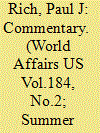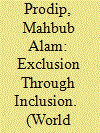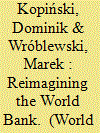|
|
|
Sort Order |
|
|
|
Items / Page
|
|
|
|
|
|
|
| Srl | Item |
| 1 |
ID:
182519


|
|
|
|
|
| Summary/Abstract |
The article develops a strategic framework to redefine American international leadership under the Biden administration. While the decline of the American-led order is not a new trend, it has been accelerated under the Trump administration, which focused on domestic policies and left the global stage in disarray. The challenges are many for the new president, and many pressures can already be felt. Biden’s administration is under high expectations to stabilize the international system and deal with the many issues that the world faces: economic recovery, COVID-19, climate change, cybersecurity, and relations with China, Russia, Iran, and North Korea, to name but a few. Yet, while the Biden presidency is—wrongly—understood as “U.S. back to normal,” the international stage has evolved. The article thus argues that restoring American world leadership means modifying that leadership and adapting it to the new reality. Building on management theories and the English School of international relations theories, the research presents a theoretical framework for reinventing and reconstructing a new form of leadership. It then applies the resulting strategic design to the Biden administration’s objectives and policies in the form of seven strategic recommendations. Ultimately, the article explains how the United States can remain world leader by acknowledging the current global situation and adopting a pragmatic vision of international affairs.
|
|
|
|
|
|
|
|
|
|
|
|
|
|
|
|
| 2 |
ID:
182524


|
|
|
| 3 |
ID:
182523


|
|
|
|
|
| Summary/Abstract |
This comparative case study uses qualitative data to explore and analyze the institutional obstacles that women in reserved seats face to their political empowerment in the Gram Panchayat in India and the Union Parishad in Bangladesh. The findings reveal that women in reserved seats in both countries confront some fundamental institutional barriers, such as a masculine model of politics, lack of political party support, as well as lack of power and resources. Indian women face serious problems—the inclusion of ex-officio members, the rotational system, bureaucratic dominance, and partisan elections—whereas Bangladeshi women suffer from the unequal distribution of reserved seats under a quota policy and lack of clarity in rules, power, and provisions. A lack of financial resources limits the effective participation of women members in the decision-making process in both countries. Further institutional reforms are vital to ensure women’s political empowerment through reserved seats in both countries.
|
|
|
|
|
|
|
|
|
|
|
|
|
|
|
|
| 4 |
ID:
182522


|
|
|
|
|
| Summary/Abstract |
This study assesses how globalization modulates the effect of governance on carbon dioxide (CO2) emissions in sub-Saharan African countries. The empirical evidence is based on Generalized Method of Moments. The minimum level (or negative threshold) of Foreign Direct Investment required for it to interact with political stability and contribute toward the green economy is 45 percent of gross domestic product (GDP), while 90 percent of GDP is the maximum level (or positive threshold) required for trade to complement “voice and accountability” in mitigating CO2 emissions. Seventy-six percent of GDP and 80 percent of GDP are, respectively, negative trade thresholds for government effectiveness and economic governance. The corresponding negative trade thresholds for the rule of law, corruption-control, and institutional governance are, respectively, 230 percent of GDP, 63.5 percent of GDP, and 106.5 percent of GDP. Actionable openness policy thresholds are provided to inform policy makers on how governance interacts with globalization to promote the green economy.
|
|
|
|
|
|
|
|
|
|
|
|
|
|
|
|
| 5 |
ID:
182521


|
|
|
| 6 |
ID:
182518


|
|
|
| 7 |
ID:
182520


|
|
|
|
|
| Summary/Abstract |
For some time now, there has been a push for the World Bank to shift its focus toward global public goods (GPGs). These are goods that, once delivered, can be unrestrictedly consumed by most—if not all—countries on the planet. Nor are their benefits rivalrous. Moreover, the production of GPGs cannot be left to markets or individual countries, as these have suboptimal incentives to act. In the wake of the COVID-19 outbreak, the concept of GPGs has seen a revival of sorts, with the pandemic not only striking just as multilateralism was at its lowest ebb, but also serving as irrefutable proof that the world needs international collaboration now more than ever. Multilateral institutions, and in particular the World Bank—a leading global institution with global membership—can rightfully be regarded as a possible solution to many global challenges. Based on interviews conducted with World Bank senior staff, as well as numerous experts, this article discusses arguments in favor of such a strategic shift. While there are legitimate claims for the Bank becoming a full-fledged provider of GPGs, the institution’s historical roots and operational constraints make this an unlikely prospect.
|
|
|
|
|
|
|
|
|
|
|
|
|
|
|
|
|
|
|
|
|